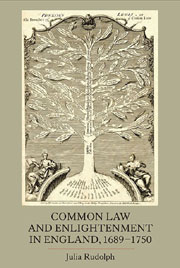Book contents
- Frontmatter
- Contents
- Acknowledgements
- Abbreviations
- 1 Against Decline
- 2 Law Books, Legal Knowledge and Enlightened Encyclopedism
- 3 Expertise and Evidentiary Practices in Science and Law
- 4 Common Law, Credit and the Growth of Commerce
- 5 Common Law Jurisprudence and the Philosophy of Natural Law
- 6 Common Law and the Morality of Markets
- 7 Legal Histories and Enlightened Historiography
- Conclusion
- Bibliography
- Index
- STUDIES IN EARLY MODERN CULTURAL, POLITICAL AND SOCIAL HISTORY
Conclusion
Published online by Cambridge University Press: 05 May 2013
- Frontmatter
- Contents
- Acknowledgements
- Abbreviations
- 1 Against Decline
- 2 Law Books, Legal Knowledge and Enlightened Encyclopedism
- 3 Expertise and Evidentiary Practices in Science and Law
- 4 Common Law, Credit and the Growth of Commerce
- 5 Common Law Jurisprudence and the Philosophy of Natural Law
- 6 Common Law and the Morality of Markets
- 7 Legal Histories and Enlightened Historiography
- Conclusion
- Bibliography
- Index
- STUDIES IN EARLY MODERN CULTURAL, POLITICAL AND SOCIAL HISTORY
Summary
The new history of English common law jurisprudence and culture introduced here emphasises development, relevance and vitality. Common law was fully engaged with multiple contemporary trends, and played a key role in the emergence of an enlightened society in eighteenth-century England. This is a fundamental revision of the long-held view that common law remained a bastion of tradition and technicality, its insularity and irrationality clearly antithetical to eighteenth-century enlightened culture and philosophy. This new history of common law also provides an important corrective to the old narrative of decline and fall, which posited that common law lost its intellectual and cultural preeminence in the eighteenth century as the previous period of Coke and Selden, custom and ancient constitution, gave way to a new era of rationalism, positivism and revolution. Once the premise of decline, and of a dichotomy between common law and Enlightenment are jettisoned, it becomes possible to recognise the ways in which common law approaches to evidentiary practices, to education and dissemination of knowledge, to commercial change and historical analysis were, in fact, in line with trends in enlightened science, encyclopedism, philosophy and historiography.
In demonstrating the dynamism of common law ideas and practices, especially in the early part of the eighteenth century, my intention, however, is not simply to replace that old narrative of decline and fall with a new story of rise and progress. Rather it is to recover the complexity of legal, intellectual and cultural change, and to foster an appreciation for the nature of continuity in action, and continuity as an approach.
- Type
- Chapter
- Information
- Common Law and Enlightenment in England, 1689-1750 , pp. 267 - 270Publisher: Boydell & BrewerPrint publication year: 2013

